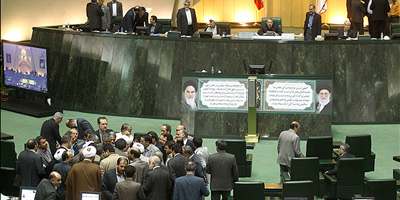ID :
262043
Mon, 11/05/2012 - 07:10
Auther :
Shortlink :
https://oananews.org//node/262043
The shortlink copeid
Questions for president read out in Iran`s Majlis

TEHRAN,Nov.5(MNA) - A text detailing questions for Iranian President Mahmoud Ahmadinejad was read out during an open session of the Majlis on Sunday.
MPs recently approved a motion to summon the president to parliament, and according to the law, Ahmadinejad has one month to respond to the summons.
The questions focus on the sharp drop in the exchange rate for Iran’s national currency, the rial, against hard currencies and the problems facing the agricultural sector.
According to the Majlis Presiding Board, the motion had the signatures of 77 MPs on it when it was read out.
The MPs who signed the motion say the Ahmadinejad administration has not properly controlled the foreign currency market.
The text was read out by MP Alireza Monadi, who is a member of the Majlis Presiding Board.
The questions ask the president to give explanations about the following points:
Over the past eight months, especially in late summer and early autumn, the value of the rial decreased sharply against foreign currencies, to the extent that after the Central Bank of Iran refused to inject foreign currency into the market for a month, on September 11, 2012, the U.S. dollar was traded at 22,000 rials in the morning, 25,000 rials at noon, and 27,000 rials in the afternoon. And then, on October 2, 2012, the dollar was traded at about 40,000 rials.
The sharp decrease in the value of the rial has led to high inflation and an economic downturn and blocked industrialists’ economic activities.
At a time when foreign currency reserves should be used for basic commodities, Customs Office documents show that in the first six months of the current Iranian calendar year (which started on March 20), about 15,700 cars were imported at a lower foreign currency exchange rate.
Since the government refused to buy wheat from farmers at a higher price, some wheat produced inside the country was either used for livestock consumption or illegally exported to neighboring countries, and thus the government was forced to spend $2.5 billion to import wheat.





